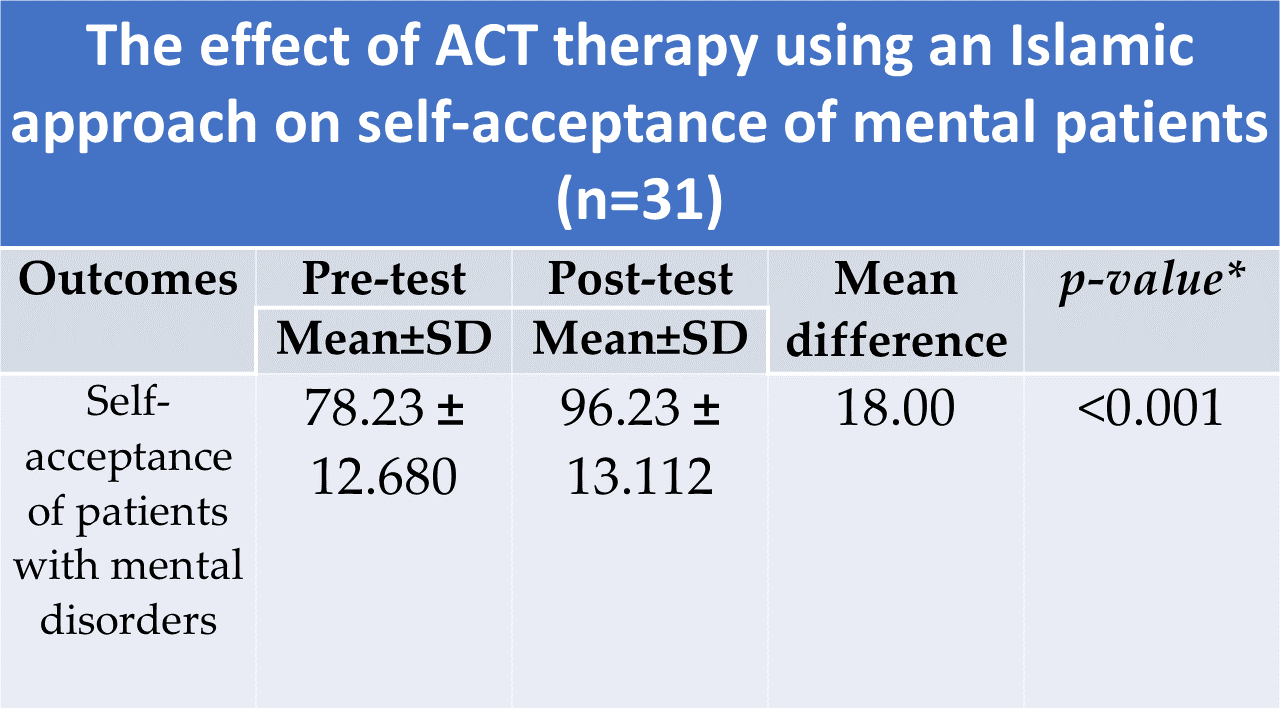The Effect of Acceptance and Commitment Therapy Islamic Approach On Self-Acceptance of Patients with Mental Disorder
DOI:
https://doi.org/10.23917/bik.v17i1.1150Keywords:
ACT, Self Acceptance, Mental disorderAbstract
Mental disorders have different manifestations and symptoms but are generally characterized by some combination of disturbances of thought, perception, emotion, behavior, and impaired relationships with other people. Severe mental disorders, including schizophrenia, are prone to stigma. Good self-acceptance has a robust negative correlation with stigma. This study examines the effect of Islamic acceptance and commitment therapy (ACT) on self-acceptance in patients with mental disorders. The research method is quantitative with a semi-experimental pre-post-test. Respondents in this study were 31 patients with mental disorders who were selected using a purposive sampling technique that met the criteria of being Muslim, awareness, and understanding of patients with mental disorders experienced in the good category, namely being aware of the disease experienced. The measuring instrument used in this study consisted of a demographic questionnaire and an Unconditional Self-Acceptance Questionnaire (USAQ). Results showed that ACT with Islamic approach significantly increased self-acceptance in a patient with mental disorders (P<0.001). ACT can be used as an effective intervention to increase self-acceptance in a patient with mental disorders.
Downloads
INTRODUCTION
Mental disorder is a disease that affects thoughts, feelings, and behavior. Mental disorders have different manifestations and symptoms but are generally characterized by disturbances of thought, perception, emotion, behavior, and impaired relationships with others [1]. The recovery process from this disease also varies depending on the type of mental disorder experienced. Some mental disorders that are classified as severe mental disorders that become common problems include depression, bipolar disorder, schizophrenia, and other psychotic disorders. Globally, it is estimated that 264 million people suffer from depression, 20 million people have schizophrenia, and about 45 million people have bipolar disorder worldwide.
Severe mental disorders, including schizophrenia, are prone to stigma. In one study, it was found that the prevalence of perceived stigma was high in people with schizophrenia, as much as 62.6%, and was significantly associated with female gender, age, the onset of schizophrenia, length of hospitalization, and duration of illness . The stigma of mental disorders seen from the patient's point of view can lead to delays in patients gaining access to care and poor adherence to treatment and follow-up care [2].
Good self-acceptance has a strong negative correlation with stigma [3], so the thing that mental patients can do is accept conditions that they have mental disorders and commit to therapy in order to achieve healing. The illness you suffer can be a trial; if you succeed in accepting it can increase the degree of your faith. One therapy that can increase self-acceptance is Acceptance and Commitment Therapy Islamic Approach. The principle of this therapy is to accept the current condition of a mental disorder and commit to achieving healing. In the teachings of Islam, endeavor and surrender are one of the efforts to achieve healing.
METHOD
The research design used was quantitative, using a quasi-experimental pre-post test without a control group to determine the level of patient self-acceptance before and after receiving therapy. this research was conducted in April-June 2022. Thirty-one mental illness patients diagnosed with schizophrenia were selected using purposive sampling technique that met the criteria of being Muslim, insight/awareness, and understanding of patients with mental disorders experienced in the good category, namely being aware of the disease experienced. The exclusion criteria set did not follow the therapy session and did not complete the questionnaire given.
Patients who met the inclusion criteria were given an explanation regarding the research procedure and asked to be a respondent by signing a consent form to become a respondent and witnessed by a nurse. ACT Islamic approach is given individually to each patient who meets the criteria. ACT therapy is carried out in 4 sessions according to the therapy module/workbook, which includes: Session I: Discussing unpleasant events or experiences experienced by the patient; Session II: Discusses the patient's response to an unpleasant experience; Session III: Identify together the impact of responses that arise from unpleasant experiences and practice acceptance using an Islamic approach by surrendering to Allah for the incident; Session IV: Identify the values that exist in the patient and discuss ways to commit and strive for therapy and achieve healing and acceptance goals based on Islamic values. Each patient received four therapy sessions, with a variation in the interval between one to three weeks.
For ethical considerations, the researcher provides complete information about the objectives and benefits of the study, gives freedom to the patient to decide whether or not to participate in the study, and maintains the confidentiality of the data of the respondents who participated in this study. In addition to applying ethical principles, this research has also received ethical approval from the Health Research Ethics Committee of UIN Alauddin Makassar with the number: C.75/KEPK/FKIK/II/2022 Health Research Ethics Committee UIN Alauddin Makassar.
The therapy sessions were conducted by researchers at Dadi Hospital in South Sulawesi Province. Before and after therapy, patients were given a questionnaire to assess the patient's self-acceptance. The questionnaire used is the Unconditional Self-Acceptance Questionnaire (USAQ) [4]. USAQ is a questionnaire used to assess the self-acceptance of patients with mental disorders. The USAQ consists of 20 questions with seven answer options, namely Strongly Not Appropriate, Not Appropriate, Slightly Not Appropriate, Neutral, Somewhat Appropriate, Appropriate, and Very Appropriate. USAQ consists of 9 positive/favorable statements and 11 negative/unfavorable statements. On a positive statement, a score of 1 is given if the answer is Almost always untrue, a score of 2 is Usually untrue, a score of 3 is More often untrue, a score of 4 is Neutral, a score of 5 is more offten true, a score of 6 is Usually true, a score of 7 is Almost always true. In negative statements, if the patient answers Almost always true, then a score of 1 to 7 is given if the answer is Almost always untrue. The score of the assessment results varies with a range of 20-140, with a higher total score indicating high self-acceptance [5].
The USAQ instrument has been widely used to measure self-acceptance, Cronbach's alpha value (α) is in the good category with acceptable internal consistency, so the instrument is feasible to use. Research that uses the USAQ instrument includes the research of [4], obtaining a value of = 0.72 of 107 participants and the results of the instrument reliability test obtained a value of = 0.84 with 300 participants [6].
The data was then analyzed, which consisted of univariate analysis using a frequency distribution containing patient demographic data. The bivariate analysis used paired t-test analysis to determine differences in patient self-acceptance before and after therapy.
RESULTS
Characteristics of respondents
Distribution of characteristics of patient with mental disorders at Dadi Hospital in South Sulawesi province (n=31) are shown in Table 1.
Table 1. Characteristics of respondents (n=31)
Table 1 shows the average age of respondents is 37 years, with the youngest age being 22 years and the oldest at 49 years old, most of whom have a high school education as many as 12 respondents. The majority of respondents are male; marital status tends to be unmarried. On average, respondents have been treated in the hospital treatment room 4 times, with the lowest number of admissions being one and the most being 19 times in and out of mental hospitals.
- The level of self-acceptance of patients with mental disorders beforeand aftergiving ACT using an Islamic approach
Table 2. Level of self-acceptance of patients with mental disorders before and after ACT (n=31)
Table 2 presents the level of self-acceptance of patients with mental disorders before and after giving ACT therapy using an Islamic approach. There are 20 components of self-acceptance that are judged to be sourced from the Unconditional Self-Acceptance Questionnaire (USAQ) standard instrument with seven scores of answer choices, namely given a score of 1 if the respondent answers almost always untrue with the existing statement, given a score of 2 if the respondent answers Usually untrue, the score of 3 if the respondent answered More often untrue, a score of 4 if the respondent was neutral, a score of 5 if the respondent answered more offten true with the existing statement, a score of 6 if the respondent answered Usually true and a score of 7 if the condition almost always true with the statement. The total score ranges from 20-140, which indicates that the higher the total score, the greater the level of self-acceptance of the respondent before administering ACT therapy.
The mean value of respondents' answers ranges from 2.42 to 5.61, which indicates the meaning of the respondent's condition that does not match the statement, and there is also a respondent's condition that is in accordance with the statement. The component that indicates the condition is not suitable is statement number 8; namely, the respondent does not set goals for himself in the hope that it makes him happy. The component that shows the appropriate condition is statement number 15; namely, the respondent thinks that people who are successful in what they do are very valuable.
When viewed from the average respondent's answer as a whole, it shows a score of 3.91 or can be rounded up to 4, which means that the average respondent answers neutrally regarding the level of self-acceptance before being given ACT therapy using an Islamic approach. The total score shows an average value of 78.23, so it can be concluded that the level of self-acceptance before being given ACT therapy is still relatively low.
The level of self-acceptance of patients with mental disorders after giving ACT therapy using an Islamic approach, the mean value of respondents' answers ranges from 3.00 to 6.84, which indicates the meaning of the respondent's condition, which is somewhat inconsistent with the statement, and there is also a respondent's condition that is very in accordance with the statement. The component that indicates the condition is somewhat inappropriate is statement number 8; namely, the respondent somewhat does not set goals for himself in the hope that it makes him happy. The component that shows the appropriate condition is statement number 11; namely, the respondent believes himself to be a useful person because the respondent is a human.
When viewed from the average respondent's answer as a whole, it shows a score of 4.81 or can be rounded up to 5 which means that the average respondent answers somewhat according to the level of self-acceptance after being given ACT therapy using an Islamic approach. The total score shows an average value of 96.23, so it can be concluded that the level of self-acceptance after being given ACT therapy is relatively high.
2. The effect of ACT using an Islamic approach on the level of self-acceptance of patients with mental disorders
Table 3 The effect of ACT therapy using an Islamic approachon self-acceptance of mental patients (n=31)
*paired sample t-test
Table 3 presents the effect of ACT therapy using an Islamic approach on self-acceptance of patients with mental disorders. The results of statistical tests showed that there was a positive and significant effect of ACT therapy on self-acceptance of mental patients (p<0.05), this was supported by the mean value of self-acceptance which increased from pre-test to post-test with a difference of 18 points. It can be concluded that ACT therapy using an Islamic approach can increase the acceptance rate of patients with mental disorders by 18 points. If, as an example, patients with mental disorders who had previously been given therapy had a self-acceptance score of 78.23, then after ACT it would increase to 96.23, or those who previously had low self-acceptance would become high after ACT therapy using an Islamic approach.
DISCUSSION
Characteristics of patients with mental disorders in this study included age, gender, education, marital status, and the number of hospitalizations. The average age of the respondents in this study is 22-49 years old, which is included in the category of young adults and middle adults. Globally, the onset of the first mental disorder occurs in individuals before the age of 25 years, as much as 62.5% (Solmi et al., 2022). Conditions that include symptoms of psychosis most often appear in late adolescence or early adulthood, with symptoms in the form of hallucinations or delusions (WHO, 2021).
Based on the results of the study, it is illustrated that before being given ACT, the average score of respondents' answers as a whole showed a score of 3.91 which means that the average respondent answered neutrally with a total score showing an average value of 78.23, which indicates the level of patient self-acceptance is still relatively low, and after being given ACT with an Islamic approach, the average respondent's answer overall shows a score of 4.81 which means that the average respondent answers somewhat according to the level of self-acceptance after being given ACT therapy using an Islamic approach. The total score shows an average value of 96.23, indicating a high self-acceptance level after being given ACT with an Islamic approach.
The results showed a significant difference in the patient's self-acceptance before and after giving ACT with an Islamic approach. Based on the findings, it can be concluded that ACT leads to increased self-acceptance of patients with mental disorders. The implementation of ACT in this study is intended to help patients with mental disorders use psychological acceptance as a coping strategy in dealing with stressful situations experienced both internally and externally that are not easy to overcome. This is in line with the findings [7] that using the ACT approach to strengthen the patient's abilities, beliefs, emotions, and emphasis on patient values can increase the sense of worthiness and self-efficacy in coping behaviors against cancer. Constructive coping used by the patient can also increase this acceptance which can affect general health. In one study, it was found that ACT also significantly improved general health and decreased aggressiveness in psychotic patients [8].
According to Hayes et al., more than half of the changes in depressive symptoms result from a lack of acceptance and willingness. A very important ACT process is dealing with clarifying one's values. Values are defined as intrinsic reinforcement, which provides a chosen direction for a person's behavior and actions despite facing obstacles. Patients may be unaware of their values when faced with a stigmatized mental illness. Therefore, helping individuals clarify their values and valuable life domains provides them with the motivation to go beyond and actively deal with adversity, including stigma and discrimination. By clarifying values and goals, patients will understand that accepting people's thoughts and feelings about their illness helps them engage in behaviors that comprise their values rather than struggling with these thoughts and feelings. So even though their activities are limited due to mental disorders, they can still carry out activities that are considered valuable, such as communicating with others, helping each other during hospitalization, and carrying out religious and spiritual activities. This is in line with research conducted by [9], ACT interventions are efficacious in reducing stigma and shame in the substance use disorder group.
Active involvement in valuable life domains leads to increased self-acceptance. The application of the ACT to psychotic patients with a history of trauma showed that the severity of psychosis and anxiety symptoms decreased during treatment. The participant's ability to regulate emotional reactions to receive trauma increased. This study also found that treatment involvement increased about seeking help for those in the ACT group compared to controls [10] . ACT can also be used by Educators of Children with Special Needs to increase educator self-acceptance, although not significantly [11] and was found to increase self-efficacy in stroke patients [12]. In the perspective of Islam, self-acceptance is part of the study of qona'ah. Qona'ah is a feeling of pleasure and satisfaction with the distribution of sustenance that Allah Ta ala has given. The nature of qona'ah is one of the characteristics that indicate the perfection of faith because this trait shows the pleasure of the person who has it towards all the provisions and destiny of Allah, including in terms of the distribution of sustenance [13]
CONCLUSION
ACT using an Islamic approach has a significant effect on the level of self-acceptance of patients with mental disorders. Nurses need to apply ACT using an Islamic approach as a modality of therapy for patients with mental disorders
References
Barida, M., & Widyastuti, D. A. (2019). Acceptance and Commitment Therapy (ACT) to Improve Educator's Self-Acceptance of Children with Special Needs. KONSELI : Jurnal Bimbingan Dan Konseling (E-Journal), 6(2), 117–124. https://doi.org/10.24042/kons.v6i2.4701
Chamberlain, J. M., & Haaga, D. A. F. (2001). Unconditional self-acceptance and psychological health. Journal of Rational-Emotive and Cognitive-Behavior Therapy, 19(3), 163–176. https://doi.org/10.1023/A:1011189416600
Daneshvar, M., Vakilian, K., Zadeh-Emran, A. H., & Zadeh, R. H. (2019). The Effect of ACT on Self-Esteem and Self-efficacy of Women with Breast Cancer in Iran. Current Women's Health Reviews, 16(1), 74–80. https://doi.org/10.2174/1573404815666191121150647
Davies, M. F. (2008). Irrational beliefs and unconditional self-acceptance. II. Experimental evidence for a causal link between two key features of REBT. Journal of Rational-Emotive and Cognitive-Behavior Therapy, 26(2), 89–101. https://doi.org/10.1007/s10942-007-0060-7
Ghouchani, S., Molavi, N., Massah, O., Sadeghi, M., Mousavi, S. H., Noroozi, M., Sabri, A., & Farhoudian, A. (2018). Effectiveness of Acceptance and Commitment Therapy (ACT) on aggression of patients with psychosis due to methamphetamine use: A pilot study. Journal of Substance Use, 23(4), 402–407. https://doi.org/10.1080/14659891.2018.1436602
Gul, M., & Aqeel, M. (2021). Acceptance and commitment therapy for treatment of stigma and shame in substance use disorders: a double-blind, parallel-group, randomized controlled trial. Journal of Substance Use, 26(4), 413–419. https://doi.org/10.1080/14659891.2020.1846803
Ismoyowati, T. W., & Adiyasa, P. (2021). Psychoeducation Strategy : 5(2), 87–96.
Maharjan, S., & Panthee, B. (2019). Prevalence of self-stigma and its association with self-esteem among psychiatric patients in a Nepalese teaching hospital: A cross-sectional study. BMC Psychiatry, 19(1), 1–8. https://doi.org/10.1186/s12888-019-2344-8
Permatasari, V., & Gamayanti, W. (2016). Gambaran Penerimaan Diri (Self-Acceptance) pada Orang yang Mengalami Skizofrenia. Psympathic : Jurnal Ilmiah Psikologi, 3(1), 139–152. https://doi.org/10.15575/psy.v3i1.1100
Rahayu, I. G. (2017). Mindfulness Dan Penerimaan Diri Siswa Kelas Viii Smp Nergi 1 Kawali Dan Implikasinya Terhadap Bimbingan Pribadi Dan Sosial (Studi Deskriptif Terhadap Siswa Kelas Viii Smp Negri 1 Kawali Tahun Ajaran 2016/2017). repository.upi.edu
Sayed, T. A., Ali, M. M., & Hadad, S. (2021). Risk factors and impact of stigma on psychiatric patients in Sohag. Egyptian Journal of Neurology, Psychiatry and Neurosurgery, 57(1). https://doi.org/10.1186/s41983-021-00403-3
Spidel, A., Lecomte, T., Kealy, D., & Daigneault, I. (2018). Acceptance and commitment therapy for psychosis and trauma: Improvement in psychiatric symptoms, emotion regulation, and treatment compliance following a brief group intervention. Psychology and Psychotherapy: Theory, Research, and Practice, 91(2), 248–261. https://doi.org/10.1111/papt.12159
Tesfaw, G., Kibru, B., & Ayano, G. (2020). Prevalence and factors associated with higher levels of perceived stigma among people with schizophrenia Addis Ababa, Ethiopia. International Journal of Mental Health Systems, 14(1), 1–8. https://doi.org/10.1186/s13033-020-00348-9
WHO. (2019). Mental Disorders. https://www.who.int/news-room/fact-sheets/detail/mental-disorders

Submitted
Accepted
Published
How to Cite
Issue
Section
License
Copyright (c) 2024 Rasmawati Rasmawati, Fauziah Nur, Sri Nurjannah

This work is licensed under a Creative Commons Attribution 4.0 International License.


















